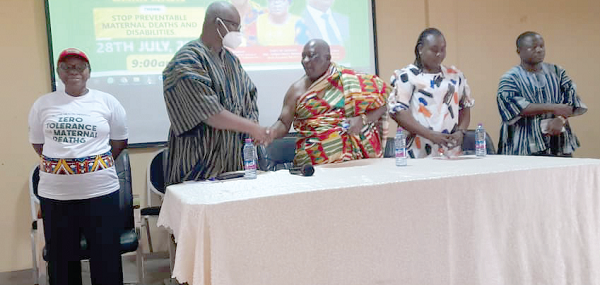The Bono Regional Health Directorate last Thursday launched a campaign to stop the rise in maternal mortality in the region.
Statistics available indicate that whereas the region recorded 22 maternal deaths in 2019, the figure increased to 26 in 2020.
In 2021, the figure jumped further to 28, while 15 maternal deaths have already been recorded this year.
It is as a result of this that the regional health directorate, in collaboration with the Family Health Division and the Ghana Health Service (GHS), launched the campaign against maternal mortality on the theme: "Stop Preventable Maternal Deaths and Disabilities".
Statistics
In an address read on her behalf, the Bono Regional Minister, Justina Owusu-Banahene, said maternal mortality continued to be a great concern globally, with almost 99 per cent of deaths occurring in developing countries and more than half in sub-Saharan Africa.
According to her, World Health Organisation (WHO) findings had revealed that every day approximately 810 women died from preventable causes related to pregnancy and child birth.
Ms Owusu-Banahene said the high number of maternal deaths in some areas of the world reflected inequalities in access to quality health services and highlighted the gap between the rich and the poor.
She explained that while the maternal mortality ratio (MMR) in low income countries in 2017 was 462 per 100,000 live births, that of the high income countries was 11 per 100,000 live births.
Ms Owusu-Banahene said to reduce maternal deaths in the country, it was vital for measures to be put in place to avoid unwanted pregnancies.
"All women, including adolescents, need access to contraception, safe abortion services to the extent of the law and quality post-abortion care," she said, adding that the government was working to address inequalities in access to quality reproductive, maternal and newborn services.
She called on authorities of the GHS in the region to take stock of past developments and find a strategic way to respond to the needs and priorities of women and girls to ensure accountability in order to improve quality of care and equity.
Comparison
Providing half-year analysis of maternal deaths in the region, the Deputy Bono Regional Director in charge of Public Health, Dr Prince Quashie, said the region recorded seven maternal deaths in June 2018, while nine deaths were recorded during the same period in 2019, 11 in 2020, nine in 2021 and 15 in 2022.
He mentioned post-partum haemorrhage (46.7 per cent) and unsafe abortion (26.7 per cent) as the two major causes of maternal deaths in the region this year.
Dr Quashie explained further that two of the victims of the 15 maternal deaths that had occurred this year were teenagers who died as a result of unsafe abortion.
He added that the regional health directorate had identified issues such as inadequate monitoring of labour, delays in the referral of critical cases to a higher facility and the inability of health personnel to identify high risk mothers for appropriate interventions as factors that contributed to rising maternal deaths in the region.
Others, according to him, were the lack of proper interpretation of vitals during anti-natal care (ANC), labour and after delivery and inadequate use of patograph, among others.
Legal abortion
For his part, the Bono Regional Coordinator, Comprehensive Abortion Care, Dr Osei Anto, said it was now legal for women to use safe means to terminate unwanted pregnancies.
He, therefore, called on women, particularly those who wanted to terminate their pregnancies, to visit hospitals for safe abortion, instead of using illegal means that could result in needless deaths.
The Omanhene of the Berekum Traditional Area, Daasebre Dr Amankona Diawuo (a medical practitioner), who chaired the function, called on health workers, particularly nurses, to take the management of patients seriously.
Writer's email: emmanuel.adu-gyamerah@graphic.com.gh

